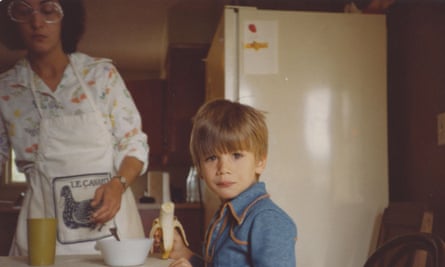As the slow grey East River passes in the distance, as the white smoke from some faraway factory rises into the white winter sky, as a lone man in a grey jacket wanders through the power plant across the street below us, Sufjan Stevens, inside his studio four floors up, shows Technicolor home movies of his family from decades before. A collection of ghosts moves jauntily to unheard music.
There’s a grandfather, there’s an aunt, an uncle, a cousin. “That’s Carrie,” he says, pointing to his mother. In the short Super-8 clips, she’s a pretty young woman with dark hair and big, wary eyes. In one film she’s standing with siblings behind a birthday cake, grimacing at the camera, uncomfortable being seen. In another, she’s on the beach, again wary, occasionally smiling. Finally, in the last film, she’s dancing slowly with a tall man, almost a head taller and far lighter of spirit, a bright-eyed man with a newly shaven head. This is Stevens’s father Rasjid, and the film, as far as Stevens can tell, is of their wedding night. Carrie and Rasjid dance slowly, her head on his chest, and face aglow, while he looks around, grinning at the camera, at Carrie’s Greek relatives, who dance merrily around them. His eyes wide and his head recently shaved, he seems eager to please. Carrie, though, has her eyes closed, her ear to her new husband’s heart, content to escape to some inner place.
We are in Stevens’s studio in Williamsburg, and outside, New York sends a blue light into these few small rooms with their wood floors and Oriental rugs. Stevens is wearing high-tops and a red baseball hat bearing the face of Animal from The Muppets. In person he is warm, approachable, startlingly eloquent. Around us are pianos, keyboards, guitars, ukeleles, the tools of a multi-instrumentalist known for a wild range of albums, from the lush pop music of The Age of Adz to the experimental noise of Enjoy Your Rabbit. Most importantly, though, to an Illinoisian like myself, Stevens is the author of the astounding double album dedicated to that greatest of US states, the Land of Lincoln. Come on Feel the Illinoise is an album known by a startling range of Illinoisians, from urban Chicago to rural Rantoul, and when or if the state names an official double-album to speak its many glories and tragedies, it will very likely be this song cycle, written by a man from Michigan. Stevens wrote an album for that state, too, but some time ago gave up on the self-inflicted task of making a record for every state, a project that would have taken him into his mid-80s. Instead, he has moved restlessly through genres, from the symphonic to the electronic, while considering himself “fundamentally a narrative folk singer, first and foremost”.
His new album, Carrie & Lowell, a return to that narrative songwriting, is a fall-down gorgeous and emotionally devastating masterpiece prompted by the death of his mother, Carrie, in 2012. It features some of the most beautiful music ever made about loss, and some of the most direct explorations of death ever recorded. It is a brutal, extremely sad, relentlessly wrenching record that, because it’s so exquisitely crafted, you might keep on a loop for days.
“Spirit of my silence, I can hear you
But I’m afraid to be near you
And I don’t know where to begin
And I don’t know where to begin.”
These are the first words of the first song, Death with Dignity, and they speak of Stevens’s confusion after the loss of his mother, his inability to know or contain it in any way, let alone through music.
“I was recording songs as a means of grieving, making sense of it,” he says. “But the writing and recording wasn’t the salve I expected. I fell deeper and deeper into doubt and misery. It was a year of real darkness. In the past my work had a real reciprocity of resources – I would put something in and get something from it. But not this time.” That he was able to make an album of such coherence and delicacy is a significant feat, given the deeply complicated relationship he had with Carrie.
She married young, and had four children in rapid succession. Her husband, Sufjan’s father, was a member of a religious group called Subud. (In the film from their wedding night, his head was shaved in accordance with Subud custom.) Carrie and Rasjid were married for seven years, then, in 1976, when Stevens was one year old and his siblings were all under 10, Carrie left the family, with no promise of returning or remaining in contact. His father eventually remarried, and the family moved around Michigan, and in and out of Subud and other faiths and allegiances, throughout Stevens’s childhood. There was never enough money to go around, and his father became the strict patriarch of a scattered brood. “We were treated like tenants,” Stevens says. “It was a familial conglomerate mess.”
Eventually Carrie remarried, too – to a man Lowell Brams, and it was through Lowell, because of Lowell, that Carrie rekindled a strained, desultory relationship with her children. Lowell was determined to arrange visits and phone calls, and he took a special interest in Sufjan. There was no music in the home Stevens shared with his father and stepmom – no records, no stereo – but Lowell, an amateur musician and avid record collector, introduced Stevens to Leonard Cohen, Frank Zappa, Judee Sill, Nick Drake, The Wipers and Mike Oldfield. He visited Stevens throughout his childhood and through high school, sending him mix tapes, and when Stevens formed his own bands at Hope College, Lowell would be in the audience, offering uncritical and unequivocal support.

“There was so little consistency in our upbringing,” Stevens says, “no allegiance to the family tree or to blood. But Lowell was there.” Lowell now runs Stevens’s small record label, Asthmatic Kitty, from his home in Wyoming.
Carrie and Lowell divorced in 1984, but stayed in touch through the years. When Carrie died, Stevens felt emotionally and creatively all over the map. He collaborated on a hip-hop album with Serengeti. He worked on a ballet. He was trying to distract himself, to stay busy. “I was trying to manipulate my mood. I was working the opposite of my own true interior envelope. I wasn’t able to admit how deeply I was affected by her death.”
Eventually, though, he began writing songs, but had no intention of making an album dedicated to Carrie and Lowell – to the mother who left and the stepdad who stayed. In fact, after recording 30 demos, Stevens had no clue what he had. “It was a shambles. I had no objectivity.” Even after nine albums, he wasn’t any better at knowing how to shape this collection into an album. “Every time I start something, I feel ignorant. It’s starting over every time.” Though he usually produces his own records, this time he turned to Thomas Bartlett, a musician-producer friend who was in a similar existential place; he had recently lost a brother to cancer.
“Thomas took all these sketches and made sense of it all. He called me out on my bullshit. He said: ‘These are your songs. This is your record.’ He was ruthless.”
The result is a tight 11-song cycle, 42 minutes that are at once brutal and beautiful, obsessed with grief and death but absolutely cathartic. For Stevens, the chaos of it all had been shaped into something with boundaries and something like clarity. “At the end I could speak for it,” he says, “for the sadness. It was dignified.”

“I forgive you mother, I can hear you
And I long to be near you
But every road leads to an end
Yes every road leads to an end
Your apparition passes through me in the willows
And five red hens
You’ll never see us again
You’ll never see us again.”
So ends Death with Dignity. The rest of the album only gets more intense.
Given the crushing emotional weight of the music, it’s impossible not to wonder how Stevens will fare playing these songs live. He’ll be on tour in the spring, and it’s natural to want to protect him from what might be a very difficult experience. But he’s looking forward to it.
“I got so little pleasure out of writing and recording the album that I feel like I’m due some enjoyment,” he says. He’ll be touring with a small band, and that might provide some insulation from the lyrics. “It helps to share the experience with other musicians onstage. It’ll help that I can focus on the performance, the finger-picking, the intonations, feeling confident in my falsetto – and forget about the content of the songs.”
The audience, though, listening live or while lying on the floor of a bedroom in a broken home, shouldn’t forget that ultimately this is an album about forgiveness. After all, whatever familial madness Stevens experienced as a child, it produced him, a person in a Muppet hat who is capable of extraordinary music. I try to sell Stevens on this theory – that whatever we go through as children of chaos, ultimately we can be thankful for it all. For life, the rich madness of it.
Stevens takes a deep breath. We both look out the window, at the frozen white sky, blank with possibility. “You can’t change your history. But you can choose to relinquish the anger, and you can choose to recognise that there’s no perfect way to cultivate a person. I believe motherhood is sainthood. That the work of a parent is the work of a saint – whether you choose to relinquish that or not.”
Carrie & Lowell is out on Asthmatic Kitty. Sufjan Stevens headlines the End of the Road festival at Larmer Tree Gardens, 4-6 September.

Comments (…)
Sign in or create your Guardian account to join the discussion